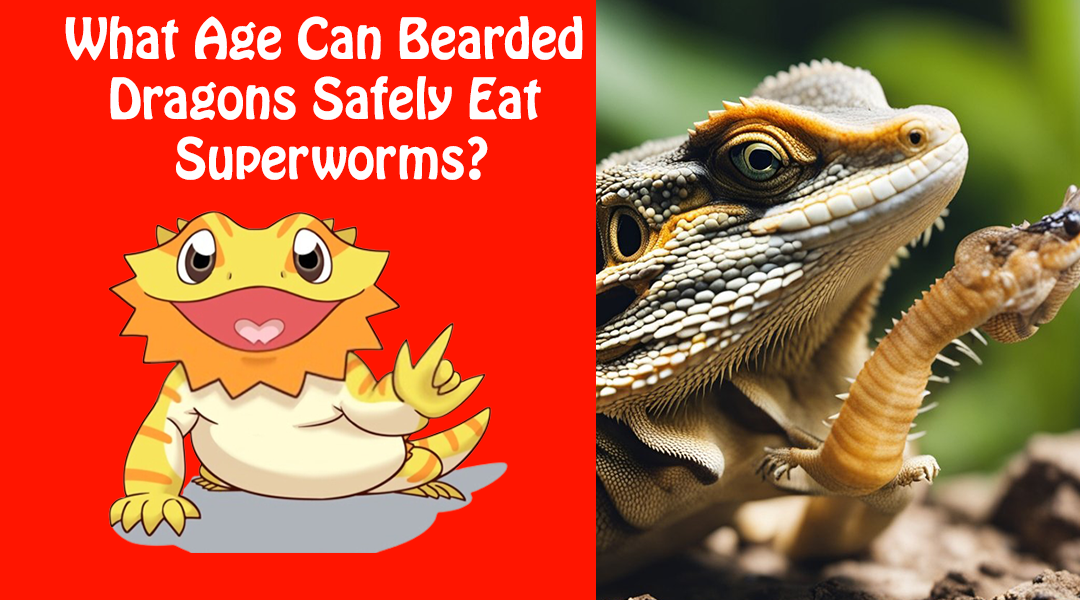Bearded dragons are a popular pet reptile species that require a diverse diet to maintain optimal health. One of the many food options for bearded dragons is superworms, which are a type of mealworm that are larger and higher in fat and protein content. However, it is important to know at what age bearded dragons can safely consume superworms to avoid any potential health risks.
According to reptile experts, bearded dragons can start eating superworms at around 4-6 months of age. At this age, they are large enough to handle the size of the superworms and have developed a strong digestive system. It is important to note that superworms should not make up the entirety of a bearded dragon’s diet and should only be fed in moderation as a treat or supplement to their regular diet of vegetables and insects.
Overall, knowing when to introduce superworms into a bearded dragon’s diet can help ensure their health and well-being. As with any new food item, it is important to monitor your pet’s behavior and digestion to ensure they are tolerating the superworms well.
Understanding Bearded Dragons’ Diet
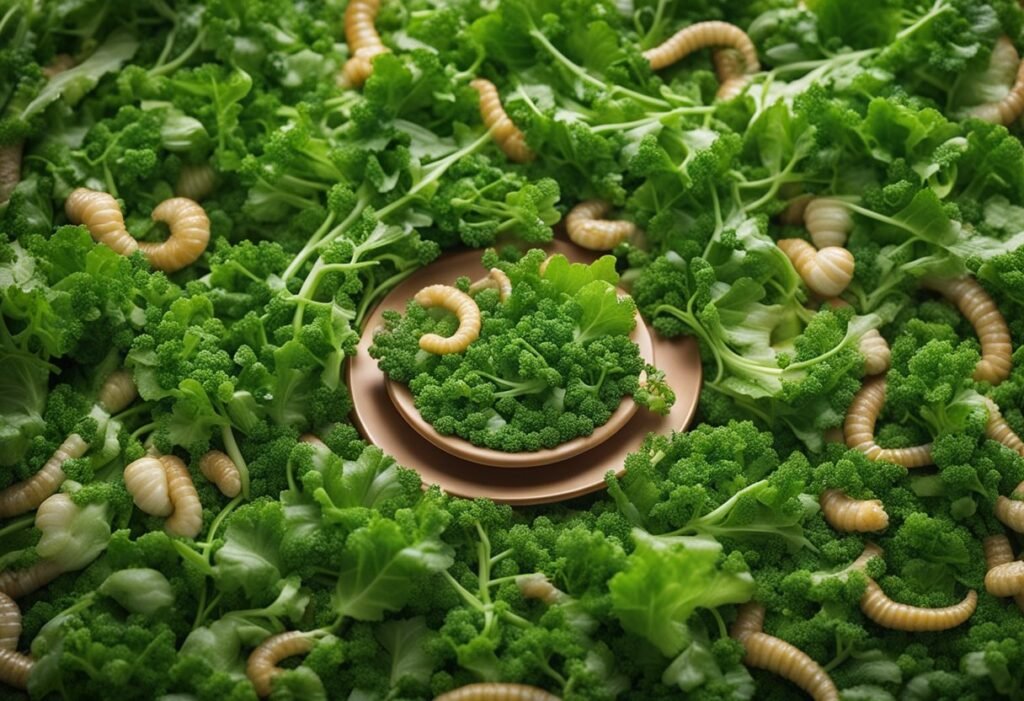
Bearded dragons are omnivorous and require a balanced diet of both insects and vegetables. Insects are an important source of protein and other nutrients for bearded dragons, and superworms are one of the most popular choices among owners.
However, it’s important to note that superworms should not be the primary source of food for bearded dragons. They are high in fat and low in calcium, which can lead to health problems if fed in excess.
Superworms can be introduced to a bearded dragon’s diet once they reach 4-6 months of age. At this age, they are able to digest the harder exoskeleton of the superworms without any issues.
It’s recommended to feed superworms as a treat, not as a staple food. Adult bearded dragons can be fed 1-2 superworms per week, while juvenile bearded dragons should be fed smaller amounts.
In addition to superworms, bearded dragons should be fed a variety of other insects such as crickets, roaches, and mealworms. It’s also important to provide a variety of vegetables to ensure a balanced diet.
Overall, while superworms can be a tasty treat for bearded dragons, it’s important to not rely on them as a primary source of food and to feed them in moderation.
What Are Superworms?
Superworms, also known as kingworms or Zophobas morio, are a popular feeder insect for many reptiles, including bearded dragons. They are native to Central and South America and are commonly sold as a food source for pets.
Superworms are similar in appearance to mealworms, but they are larger and have a softer exoskeleton. They are typically between 2-3 inches in length and have a dark brown color. They are also more active than mealworms, making them a more engaging food source for bearded dragons.
Superworms are high in protein and fat, making them a nutritious addition to a bearded dragon’s diet. However, they should be fed in moderation as they are also high in chitin, which can be difficult for bearded dragons to digest in large quantities.
It is important to note that not all bearded dragons will enjoy eating superworms. Some may prefer other feeder insects, such as crickets or dubia roaches. As with any new food source, it is important to introduce superworms slowly and monitor your bearded dragon’s reaction.
Age Considerations for Bearded Dragons
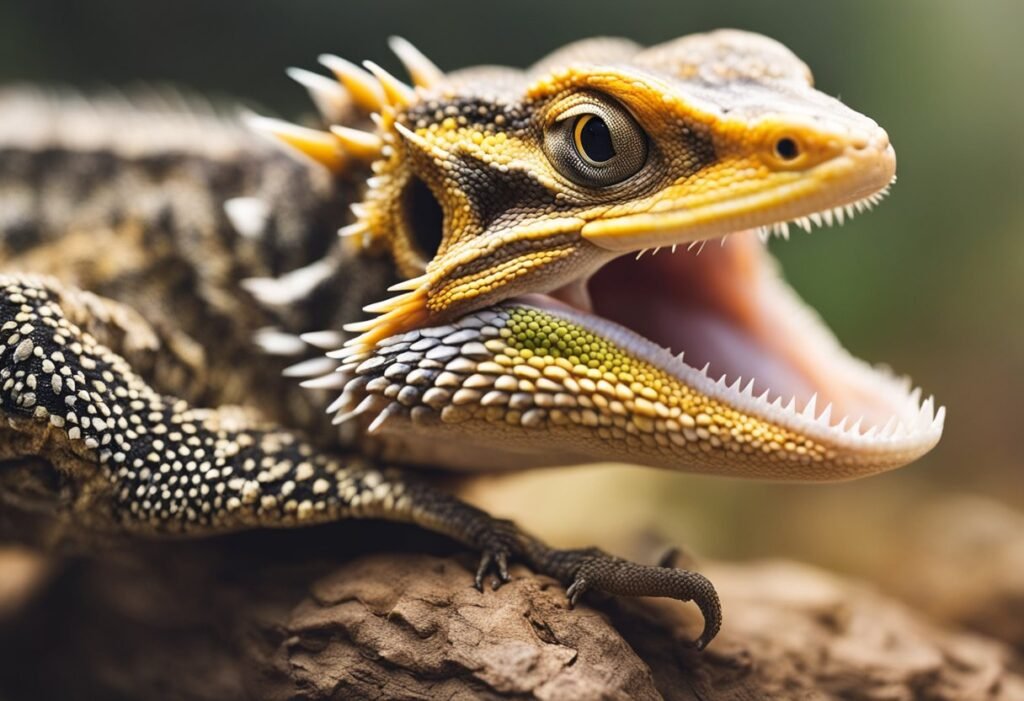
When it comes to feeding bearded dragons, it is important to consider their age. Younger bearded dragons have different nutritional needs than adult bearded dragons, and this can affect what types of food they can eat.
Superworms are a popular food choice for bearded dragons, but it is important to wait until the bearded dragon is old enough to handle them. Generally, we recommend waiting until the bearded dragon is at least 6 months old before introducing superworms into their diet.
Younger bearded dragons have smaller digestive systems and may have difficulty digesting larger prey items like superworms. Additionally, superworms have a hard exoskeleton that can be difficult for younger bearded dragons to break down.
It is also important to note that superworms should not be the sole source of nutrition for bearded dragons, regardless of their age. Bearded dragons require a balanced diet that includes a variety of insects, vegetables, and fruits.
In summary, while superworms can be a nutritious addition to a bearded dragon’s diet, it is important to wait until the bearded dragon is at least 6 months old before introducing them. Additionally, be sure to provide a balanced diet that includes a variety of foods to ensure your bearded dragon is getting all the nutrients they need.
When Can Bearded Dragons Start Eating Superworms
Superworms are a popular feeding option for many reptile owners because of their high protein content. However, it is important to know when it is safe to introduce superworms into a bearded dragon’s diet.
Young Bearded Dragons
Young bearded dragons should not be fed superworms until they are at least 4-6 months old. At this age, they are large enough to handle the size of the superworms and have a better chance of digesting them properly.
It is important to note that superworms should not be the primary source of protein for young bearded dragons. They should be fed a variety of insects, such as crickets and dubia roaches, along with leafy greens and vegetables.
Adult Bearded Dragons
Adult bearded dragons can safely eat superworms as a part of their diet. However, they should still be fed a variety of insects and vegetables to ensure they are getting all the necessary nutrients.
It is recommended to feed adult bearded dragons superworms in moderation, as they are high in fat. Too many superworms can lead to obesity and other health issues.
In conclusion, bearded dragons can start eating superworms at around 4-6 months of age. However, it is important to feed them a variety of insects and vegetables to ensure they are getting all the necessary nutrients. Adult bearded dragons can safely eat superworms in moderation as a part of their diet.
Benefits and Risks of Superworms
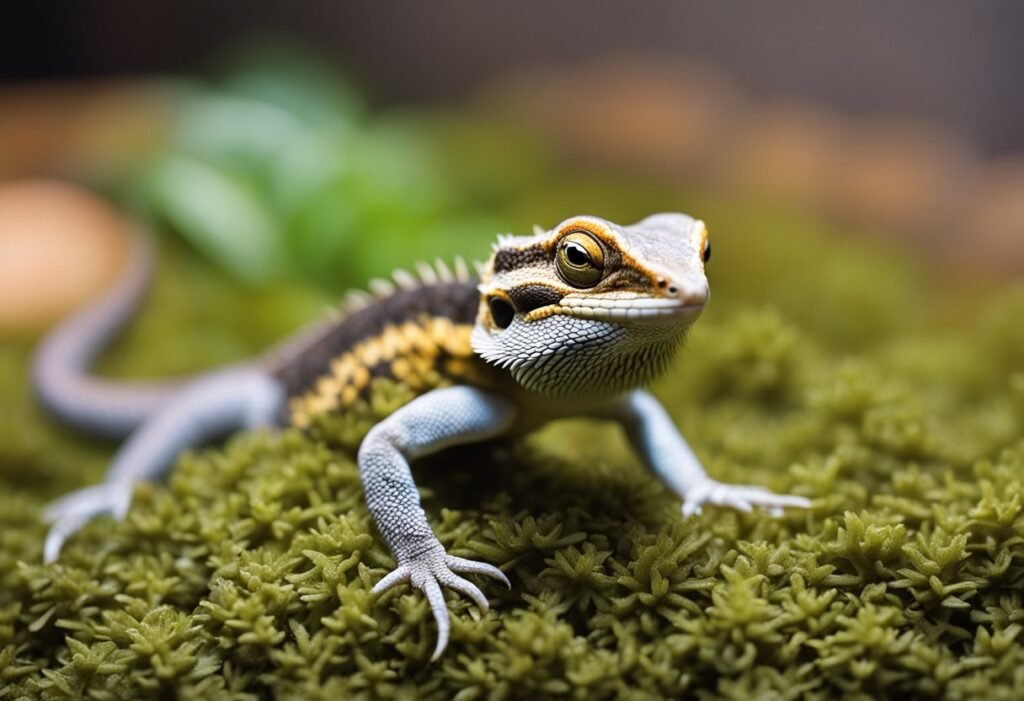
Nutritional Value
Superworms are a popular feeder insect for bearded dragons due to their high nutritional value. They are a good source of protein, fat, and fiber, as well as vitamins and minerals such as calcium, phosphorus, and potassium. Superworms also have a lower ratio of exoskeleton to meat than other feeder insects, making them easier for bearded dragons to digest.
Potential Health Risks
While superworms can provide many benefits to bearded dragons, there are also potential health risks that should be considered. One concern is the possibility of impaction, which can occur when bearded dragons ingest too many superworms or when the worms are too large. Impaction can lead to digestive issues and even death in severe cases.
Another potential risk is the possibility of superworms carrying parasites or harmful bacteria. It is important to purchase superworms from a reputable source and to properly clean and disinfect their enclosure to prevent the spread of any diseases.
Lastly, superworms have a higher fat content than some other feeder insects, which can lead to obesity and other health issues if they are overfed. It is important to provide a balanced diet for bearded dragons and to limit the number of superworms they consume.
In summary, superworms can provide many nutritional benefits for bearded dragons, but it is important to be aware of the potential health risks and to feed them in moderation.
How to Feed Superworms to Bearded Dragons
Feeding superworms to bearded dragons is a great way to provide them with a nutritious meal. However, it’s important to know when and how to feed them to ensure your pet stays healthy. In this section, we will discuss how to feed superworms to bearded dragons.
Preparation
Before feeding superworms to your bearded dragon, it’s important to prepare them properly. Here are some steps to follow:
- Purchase healthy superworms from a reputable source.
- Keep them in a separate container with bedding and food.
- Provide them with a healthy diet of vegetables, fruits, and grains.
- Dust them with calcium powder before feeding them to your bearded dragon.
Feeding Frequency
Bearded dragons can eat superworms, but they should not be the only food source. It’s important to provide them with a balanced diet that includes vegetables, fruits, and insects. Here are some guidelines to follow:
- Feed your bearded dragon superworms once or twice a week.
- Only feed them as much as they can eat in 10-15 minutes.
- Do not leave superworms in their enclosure as they may bite your pet.
- Always supervise your bearded dragon while they are eating.
In summary, feeding superworms to bearded dragons can be a great addition to their diet. However, it’s important to prepare them properly and feed them in moderation. By following these guidelines, you can ensure your pet stays healthy and happy.
Alternatives to Superworms
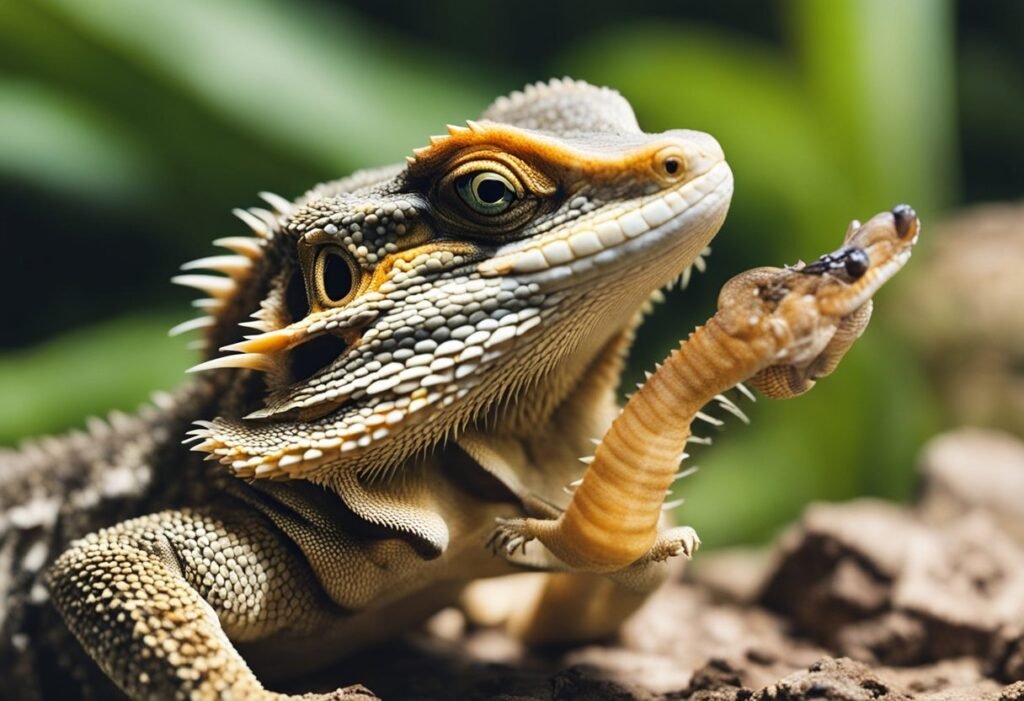
While superworms are a popular choice for feeding bearded dragons, there are other options available if you prefer not to use them. Here are some alternatives to consider:
Crickets
Crickets are a common feeder insect for bearded dragons and are readily available at most pet stores. They are high in protein and can be gut-loaded to provide additional nutrition. However, they can be noisy and may escape from their enclosure if not properly contained.
Dubia Roaches
Dubia roaches are another popular feeder insect for bearded dragons. They are high in protein and low in fat, making them a nutritious option. They are also easy to digest and can be gut-loaded for additional nutrition. However, they can be expensive and may not be available at all pet stores.
Mealworms
Mealworms are a common feeder insect for bearded dragons, but they should be used sparingly as they are high in fat. They can be gut-loaded for additional nutrition and are readily available at most pet stores. However, they can be difficult to digest and may cause impaction if fed in large quantities.
Hornworms
Hornworms are a nutritious feeder insect for bearded dragons, but they can be difficult to find. They are high in protein and low in fat, making them a healthy option. They are also easy to digest and can be gut-loaded for additional nutrition. However, they can be expensive and may not be available at all pet stores.
Overall, there are several alternatives to superworms that can be used to feed bearded dragons. It’s important to choose a variety of feeder insects to provide a balanced diet and to avoid overfeeding any one type.
Conclusion
In conclusion, superworms can be a great addition to a bearded dragon’s diet. However, it is important to wait until the dragon is at least 4-6 months old before introducing superworms into their diet. This will ensure that their digestive system is fully developed and can handle the tougher exoskeleton of the superworm.
Additionally, it is important to feed superworms in moderation and to always gut-load them with nutritious foods before feeding them to your bearded dragon. This will ensure that your dragon is getting the proper nutrients they need to thrive.
It is also important to note that while superworms can be a great source of protein for your bearded dragon, they should not be the sole source of protein in their diet. It is important to offer a variety of protein sources, such as crickets, dubia roaches, and black soldier fly larvae, to ensure that your dragon is getting a well-rounded diet.
Overall, with proper care and feeding, superworms can be a great addition to your bearded dragon’s diet. Just remember to wait until they are old enough and to feed them in moderation.
Frequently Asked Questions
What insects are suitable for a bearded dragon’s diet?
Bearded dragons require a balanced diet that includes insects, vegetables, and fruits. Some of the insects that are suitable for their diet include crickets, mealworms, superworms, and waxworms. It is important to feed them a variety of insects to ensure they receive all the necessary nutrients.
Can baby bearded dragons eat mealworms?
Yes, baby bearded dragons can eat mealworms, but they should be fed in moderation. Mealworms have a hard exoskeleton that can be difficult for baby bearded dragons to digest. It is recommended to feed them small amounts of mealworms as a treat and to ensure they are getting a balanced diet.
How many superworms should be fed to a juvenile bearded dragon?
Juvenile bearded dragons can eat up to 10 superworms per feeding, but it is important to not overfeed them. Superworms are high in fat and should be fed in moderation to prevent obesity.
Can bearded dragons eat wax worms?
Bearded dragons can eat wax worms, but they should only be fed as an occasional treat. Wax worms are high in fat and should not be a staple in their diet.
Are superworms a better option than crickets for bearded dragons?
Superworms and crickets both provide important nutrients for bearded dragons. However, superworms are higher in fat and should be fed in moderation. Crickets are a good staple insect for their diet.
How many worms should a baby bearded dragon consume?
Baby bearded dragons should be fed small amounts of insects several times a day. It is recommended to feed them 20-30 small insects per day, such as small crickets or small pieces of mealworms. It is important to not overfeed them to prevent obesity.
I, Mark Antonelli am highly interested in pet care tips. The experiences I gained through university life in animal sciences were also helpful to identify the best tricks for caring for and feeding varying kinds of pets. I know the majority of people love to own a pet. Yet, there is a guilty of owing a Bearded Dragon due to a lack of information about how much friendly and peaceful they are. I thought of filling this gap with detailed writings about this Pogona genus Bearded Dragon. All my team is also giving me great support to fulfil my mission. Hope you will enjoy the journey with us.

